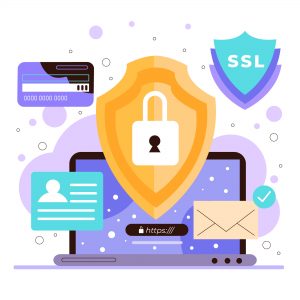
In today’s digital landscape, data security is of paramount importance, especially for e-commerce businesses that handle sensitive customer information. The rise in cyber threats necessitates robust measures to safeguard customer data and maintain their trust. In this article, we will explore some best practices that e-commerce businesses can implement to protect customer data and mitigate the risks of data breaches.
Implement Strong Access Controls
To ensure that only authorized individuals have access to sensitive customer data, it is crucial to implement strong access controls. Utilize complex passwords, multi-factor authentication (MFA), and role-based access permissions to protect against unauthorized access attempts. According to a study conducted by Verizon, 81% of data breaches are caused by weak or stolen passwords. By enforcing strong access controls, e-commerce businesses can significantly reduce the risk of unauthorized data access.
Encrypt Data Transmission
Encrypting data transmission is vital to protect customer information from interception by unauthorized parties. Utilize secure communication protocols such as HTTPS (Hypertext Transfer Protocol Secure) to encrypt data transmitted between customers and your website. Secure Sockets Layer (SSL) and Transport Layer Security (TLS) protocols provide encryption and authentication, ensuring data integrity during transit. Research conducted by Google indicates that HTTPS usage has a positive impact on search engine rankings, making it not only essential for data security but also for improving your website’s visibility and credibility.
Employ Robust Firewall and Intrusion Detection Systems
Firewalls act as a first line of defense against unauthorized access and malicious attacks. Deploy a robust firewall to monitor and filter incoming and outgoing network traffic, blocking potential threats. Additionally, implementing an intrusion detection system (IDS) enhances security by detecting and responding to any suspicious activity. A report by the Ponemon Institute revealed that organizations with IDS experience an average cost savings of $1.6 million due to reduced data breaches. These measures significantly bolster the security posture of your e-commerce business.
Regularly Update and Patch Systems
Outdated software and systems are prone to vulnerabilities that can be exploited by hackers. Keeping your e-commerce platform, content management systems, plugins, and other software up to date is crucial. Regularly applying security patches and updates helps address known security issues and reduces the risk of unauthorized access. According to the National Institute of Standards and Technology (NIST), 85% of all targeted attacks could be prevented by regularly updating software. Implementing a proactive approach to system updates is essential for maintaining a secure environment.
Secure Payment Processes
For e-commerce businesses, securing payment processes is crucial to protecting customer financial data. Utilize secure payment gateways that comply with Payment Card Industry Data Security Standard (PCI DSS). PCI DSS ensures that sensitive cardholder data is handled securely during payment transactions, minimizing the risk of data breaches. Additionally, adopting tokenization and end-to-end encryption techniques further strengthens the security of customer payment data. A study by Verizon found that businesses that comply with PCI DSS experience fewer breaches and lower breach-related costs compared to non-compliant organizations.
Educate and Train Employees
Human error is a common factor contributing to data breaches. Educating and training your employees about data security best practices is essential. Emphasize the importance of strong passwords, recognizing phishing attempts, and following security protocols. Conduct regular training sessions and keep employees informed about emerging threats and preventive measures. According to IBM’s 2020 Cost of a Data Breach Report, organizations with an extensively trained security team experienced an average cost savings of $2 million in data breach incidents.
Regularly Backup Data
Data backups are essential for quick recovery in the event of a data breach or system failure. Implement regular data backups to secure customer information and critical business data. Store backups in a secure offsite location or leverage cloud-based backup solutions to ensure data availability and integrity. According to the Global Data Protection Index 2020, businesses that back up their data experience less downtime and have shorter recovery times, minimizing the impact of potential data breaches.
Protecting customer data is a top priority for e-commerce businesses in an era where cyber threats continue to evolve. By implementing strong access controls, encrypting data transmission, employing robust firewalls and intrusion detection systems, keeping systems updated, securing payment processes, educating employees, and regularly backing up data, e-commerce businesses can mitigate the risks of data breaches and safeguard customer trust. Prioritizing data security not only protects customers but also strengthens the reputation and longevity of your e-commerce business in the highly competitive digital landscape.
Remember, data security is an ongoing process that requires constant vigilance and adaptation to emerging threats. By following these best practices, e-commerce businesses can stay one step ahead of cybercriminals and ensure the security of customer data.



